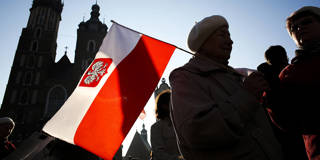The Roots of Polish Populism
Since coming to power eight years ago, Poland's populist ruling party has continued to win elections even as it has attacked the country's liberal institutions and individual rights. With Poland holding a general election on October 15, will its ability to manipulate Polish history and culture as a political cudgel continue to bring them electoral success?
Irena Grudzińska Gross: With Poland’s parliamentary election coming next month, your new book, Society of Populists, co-authored with Przemysław Sadura, is being widely read and discussed. Even Prime Minister Mateusz Morawiecki has commented on it, though he belongs to the populist ruling party. What does your title mean, and how are you defining populism?
Sławomir Sierakowski: We wanted to understand populism as a social phenomenon. That meant examining the specific societal factors behind populist victories, and then studying how populist victories have changed society. No one else has approached the subject like that.
Populism is a reaction to the unfulfilled promises of democracy. Or, rather, it is a reaction to globalization and the perception that decisions are increasingly made by experts and financial markets that exist beyond the scope of democratic structures. Populism is an attempt to reclaim people’s voices. But an interesting question remains: Why does this supposedly healthy reaction lead to such poor results – from the crisis of democracy to the rise of international conflicts?
Our book is the culmination of research conducted over four years. We surveyed more than 20,000 Poles, held dozens of focus groups, and interviewed experts on various topics. It was the most comprehensive research project on Polish political life since 1989. The book, however, is a polemic. It belongs next to other recent works on populism such as Jan-Werner Mueller’s What Is Populism?, Anne Applebaum’s Twilight of Democracy, and Jason Stanley’s How Fascism Works.
